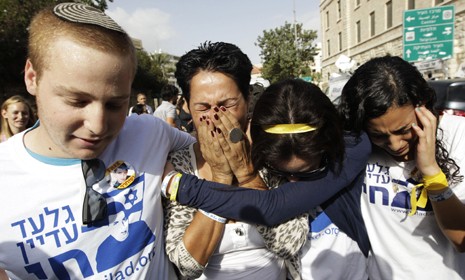The 'painful' deal to free Israel's Gilad Shalit: Winners and losers
Israel strikes an agreement with Hamas, freeing 1,000 Palestinians in exchange for a single Israeli soldier

A free daily email with the biggest news stories of the day – and the best features from TheWeek.com
You are now subscribed
Your newsletter sign-up was successful
Israel and the militant Islamist group Hamas announced Tuesday that they had reached a deal to free Staff Sgt. Gilad Shalit, an Israeli soldier held captive in the Gaza Strip for five years, in exchange for the release of more than 1,000 Palestinians from Israeli prisons. Palestinians celebrated in the streets after hearing the news, and Shalit's parents thanked supporters, although they stopped short of dismantling the protest tent they put up a year ago to push for their son's freedom. If the deal is implemented, freed prisoners could start going home early next week. Here, a look at who benefits from the deal, and who gets hurt:
WINNERS
Israelis
The Week
Escape your echo chamber. Get the facts behind the news, plus analysis from multiple perspectives.

Sign up for The Week's Free Newsletters
From our morning news briefing to a weekly Good News Newsletter, get the best of The Week delivered directly to your inbox.
From our morning news briefing to a weekly Good News Newsletter, get the best of The Week delivered directly to your inbox.
Shalit's release will lift a heavy emotional burden for the young soldier, his family, Prime Minister Benjamin Netanyahu, and Israelis in general. "The modest smiles on the faces of his parents, Noam and Aviva Shalit, upon hearing the news that their son will finally see the light of day after five years and four months of grueling secret captivity, will be hailed as an iconic moment in Israel," says Tony Karon at TIME. Netanyahu also wins kudos for striking a "painful deal" that was necessary to remove "a source of enduring national anguish and pain."
Hamas
"Hamas will benefit politically from this deal," says Robert M. Danin at the Council on Foreign Relations. This strengthens the group's argument that its "hard-line approach pays greater dividends than the nonviolent tactics employed by Fatah's leader Mahmoud Abbas." And now, when Hamas-Fatah reunification talks inevitably begin again, Hamas, "having just secured so many prisoners," will have a stronger bargaining position than ever.
Egypt
A free daily email with the biggest news stories of the day – and the best features from TheWeek.com
Egypt was a key player in helping to broker this deal — a much-needed victory. The country's transitional government and military leadership have been undermined by a string of embarrassments recently, say Daniel Nisman and Avi Yesawich at The Jerusalem Post. First came attacks on the Israeli embassy. Next up was sectarian violence between Egyptian Muslims and Coptic Christians — capped by a deadly police crackdown on Coptic protesters. But now, the key role Egypt played "in the brokerage of the prisoner swap allows them the renewed prestige of regional leader — even if it proves temporary."
LOSERS
Mahmoud Abbas
"There's little political gain in the deal for Abbas," says Karon at TIME. He's touring the world to rally support for his push to get the U.N. to recognize a Palestinian state. Publicly, Abbas says he's happy about the release of any Palestinian, whether from Fatah or Hamas. But his Palestinian Authority had nothing to do with the deal, so deep down he's probably hoping that "the attention garnered by the prisoner swap passes quickly" so his "diplomatic quest" can return to center stage.
Benjamin Netanyahu
Israel's prime minister wrote the book, literally, on why it's important not to negotiate with terrorists, says Danin at the Council on Foreign Relations. So for Netanyahu, opening the prison gates "is a heavy price to pay" to win the freedom of a soldier. "It signals that Israel will indeed negotiate, albeit under duress, for hostages and with an organization that most of the world regards as terrorists." Netanyahu will also have to explain why he's willing to talk to Hamas, says Tod Robberson at The Dallas Morning News, but not to re-open peace talks with the Abbas' Palestinian government.
Yesterday's victims... and tomorrow's
Among the Palestinians to be released are "400 serving long sentences for some of the worst terrorist atrocities in the country's history," says Melanie Philips at Britain's Daily Mail. It's unclear whether they will be able to go home or have to live in exile, but their release will only encourage Islamists to capture more Israeli Defense Force (IDF) soldiers as bargaining chips. It also "makes it more likely that more Israelis will be murdered by terrorism in Israel, and demoralizes those soldiers who brought these 1,000 terrorists to justice in the first place."
-
 6 of the world’s most accessible destinations
6 of the world’s most accessible destinationsThe Week Recommends Experience all of Berlin, Singapore and Sydney
-
 How the FCC’s ‘equal time’ rule works
How the FCC’s ‘equal time’ rule worksIn the Spotlight The law is at the heart of the Colbert-CBS conflict
-
 What is the endgame in the DHS shutdown?
What is the endgame in the DHS shutdown?Today’s Big Question Democrats want to rein in ICE’s immigration crackdown